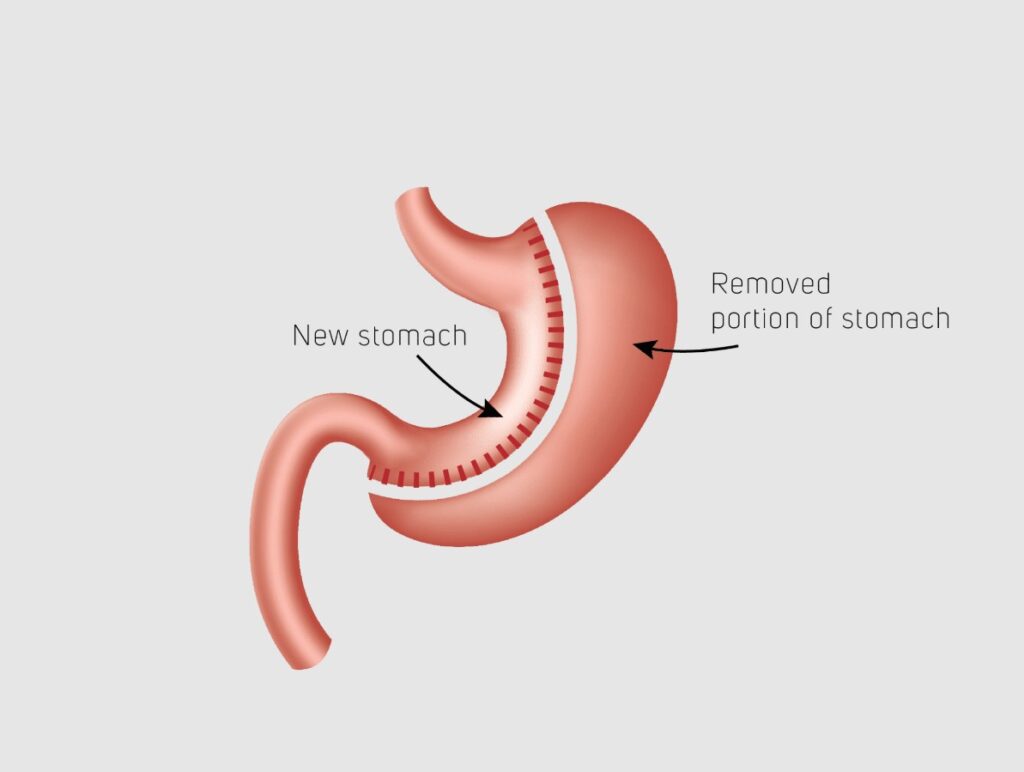Gastric sleeve surgery, also known as sleeve gastrectomy, is a type of bariatric surgery designed to help patients lose weight by reducing the stomach’s size. This procedure is typically recommended for individuals that have not achieved success with diet and exercise alone.
Gastric sleeve surgery reduces the stomach’s size by about 80%, leaving a banana-shaped, tube-like structure. This smaller stomach limits calorie intake and also decreases appetite by removing the fundus, the portion responsible for producing the hunger hormone, ghrelin.

Gastric sleeve surgery is performed to address obesity and its related health issues, which can significantly impact life expectancy. It’s often recommended for patients with severe obesity when other methods, like diet and exercise, haven’t been effective. This minimally invasive procedure, done laparoscopically, involves small incisions, making recovery quicker and reducing the risk of complications. Gastric sleeve surgery is highly popular for its effectiveness and relatively low recovery time, and it can help improve conditions like type 2 diabetes, hypertension, high cholesterol, joint pain, sleep apnea, and even PCOS, potentially enhancing pregnancy outcomes.
The eligibility for gastric sleeve surgery is determined by a medical team, with typical requirements including:
A Body Mass Index (BMI) of at least 30 or an obesity-related health condition
Absence of active infections or acid reflux caused by a hiatal hernia
Additional testing for chronic conditions (e.g., thyroid disease, Crohn’s disease)
For further details or to determine your eligibility, contact us and we will arrange a medical consultation with Dr Tuna.
Once qualified, patients receive a pre-surgery liver fat-reducing diet and are advised to fast (no food or liquids) for 12 hours before the procedure. Additionally:
Vitamin K should be discontinued 30 days prior to surgery to avoid increased bleeding risks.
Oral contraceptives and hormonal treatments (e.g., HRT patches, coils) should be stopped one month before surgery due to clotting risks.
Smoking and alcohol should be avoided; smoking at least one week before and three weeks after surgery, while alcohol should be avoided for three months pre-surgery.
Gastric sleeve surgery is performed laparoscopically under general anesthesia. During the procedure, 4-5 small incisions are made, through which the surgeon inserts tools and a camera to view and operate on the stomach. About 80% of the stomach, including the fundus, is removed, creating a banana-shaped sleeve that reduces hunger and calorie intake. The procedure typically uses a surgical stapler to create the new stomach and closes the incision sites with sutures to prevent hernias.
After surgery, patients will receive a diet plan and medications, including blood thinners (if prescribed) and pain relievers. The dietary progression post-surgery is as follows:
Liquid Stage: Only liquids like protein shakes, soup, and herbal teas.
Puree Stage: Introduce mashed and blended foods.
Solid Food: After six weeks, solid foods can be reintroduced gradually, avoiding simultaneous intake of solid and liquid foods.
Patients should avoid caffeine for the first 12 weeks and carbonated drinks for one year and refrain from smoking, alcohol, and strenuous physical activity for at least three weeks.
Although generally safe, gastric sleeve surgery does carry some risks, including infection, leaks, bleeding, anesthesia reactions, and blood clots. Longer-term side effects, due to the surgical changes in the digestive system, may include:
Nausea and vomiting
Fatigue
Dry skin
Mood changes
Gastroesophageal reflux
While a properly conducted gastric sleeve surgery typically results in substantial weight loss, some patients may regain weight due to lifestyle habits. In such cases, revisional surgery, such as a gastric bypass, or even a second gastric sleeve procedure (re-sleeving), may be recommended.
Gastric sleeve surgery offers a faster recovery, fewer risks of long-term complications, and a relatively comfortable healing process compared to other bariatric surgeries. The procedure is simpler, usually completed within an hour, and it leaves the rest of the digestive system intact, requiring patient to take vitamins for life.
Considerations include the procedure’s irreversibility, potential worsening of acid reflux in patients with hiatal hernias, and the likelihood of excess skin post-weight loss. As with any surgery, there are associated risks that must be carefully considered.
Bariatric & Beyond offers a seamless process for gastric sleeve surgery in Turkey, covering everything from airport transfers and pre-op testing to post-op dietary and medical support, making it a comprehensive option for international patients seeking this procedure.
If you choose gastric sleeve surgery with Bariatrics & Beyond the cost will be £3,450. This covers all surgical assessments, the gastric sleeve procedure, three nights’ stay at hospital for yourself and a companion, plus a further night at a nearby luxury hotel to aid your recovery (as well as all airport-hospital-hotel transfers). The price also includes all pre and post-surgical dietary and medical support by our UK-based team.
At Bariatrics and Beyond, we offer transformative weight loss and plastic surgery in Adana, Turkey, empowering patients to reclaim control of their weight loss journey and live life to the fullest.
© 2025 Bariatrics and Beyond. All Rights Reserved.